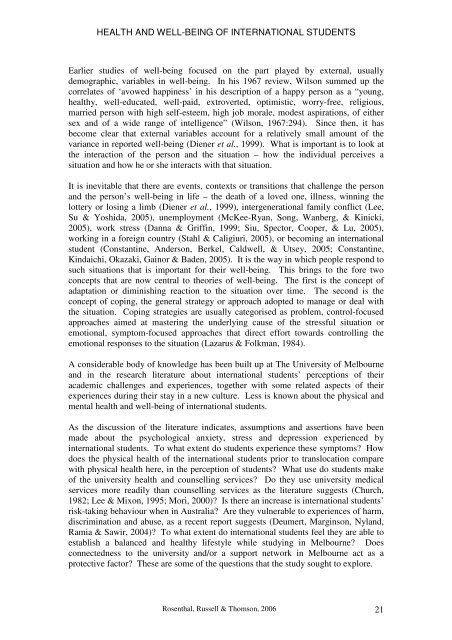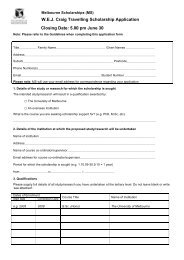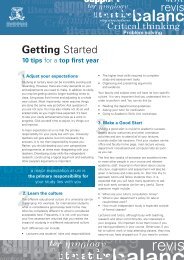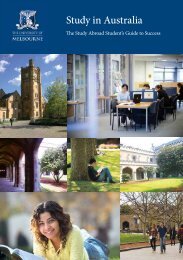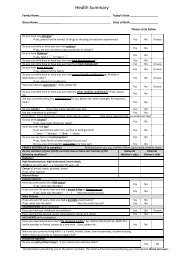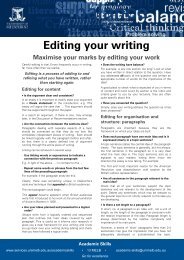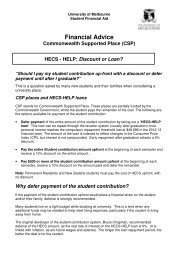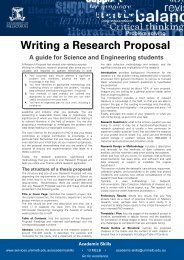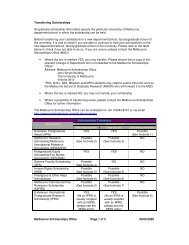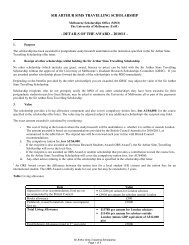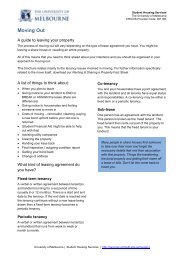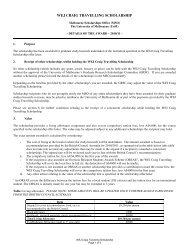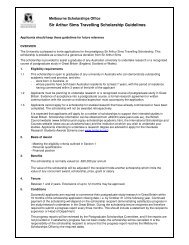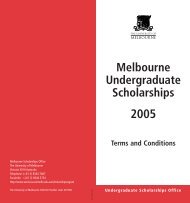a growing experience - Student Services - University of Melbourne
a growing experience - Student Services - University of Melbourne
a growing experience - Student Services - University of Melbourne
Create successful ePaper yourself
Turn your PDF publications into a flip-book with our unique Google optimized e-Paper software.
HEALTH AND WELL-BEING OF INTERNATIONAL STUDENTSEarlier studies <strong>of</strong> well-being focused on the part played by external, usuallydemographic, variables in well-being. In his 1967 review, Wilson summed up thecorrelates <strong>of</strong> ‘avowed happiness’ in his description <strong>of</strong> a happy person as a “young,healthy, well-educated, well-paid, extroverted, optimistic, worry-free, religious,married person with high self-esteem, high job morale, modest aspirations, <strong>of</strong> eithersex and <strong>of</strong> a wide range <strong>of</strong> intelligence” (Wilson, 1967:294). Since then, it hasbecome clear that external variables account for a relatively small amount <strong>of</strong> thevariance in reported well-being (Diener et al., 1999). What is important is to look atthe interaction <strong>of</strong> the person and the situation – how the individual perceives asituation and how he or she interacts with that situation.It is inevitable that there are events, contexts or transitions that challenge the personand the person’s well-being in life – the death <strong>of</strong> a loved one, illness, winning thelottery or losing a limb (Diener et al., 1999), intergenerational family conflict (Lee,Su & Yoshida, 2005), unemployment (McKee-Ryan, Song, Wanberg, & Kinicki,2005), work stress (Danna & Griffin, 1999; Siu, Spector, Cooper, & Lu, 2005),working in a foreign country (Stahl & Caligiuri, 2005), or becoming an internationalstudent (Constantine, Anderson, Berkel, Caldwell, & Utsey, 2005; Constantine,Kindaichi, Okazaki, Gainor & Baden, 2005). It is the way in which people respond tosuch situations that is important for their well-being. This brings to the fore twoconcepts that are now central to theories <strong>of</strong> well-being. The first is the concept <strong>of</strong>adaptation or diminishing reaction to the situation over time. The second is theconcept <strong>of</strong> coping, the general strategy or approach adopted to manage or deal withthe situation. Coping strategies are usually categorised as problem, control-focusedapproaches aimed at mastering the underlying cause <strong>of</strong> the stressful situation oremotional, symptom-focused approaches that direct effort towards controlling theemotional responses to the situation (Lazarus & Folkman, 1984).A considerable body <strong>of</strong> knowledge has been built up at The <strong>University</strong> <strong>of</strong> <strong>Melbourne</strong>and in the research literature about international students’ perceptions <strong>of</strong> theiracademic challenges and <strong>experience</strong>s, together with some related aspects <strong>of</strong> their<strong>experience</strong>s during their stay in a new culture. Less is known about the physical andmental health and well-being <strong>of</strong> international students.As the discussion <strong>of</strong> the literature indicates, assumptions and assertions have beenmade about the psychological anxiety, stress and depression <strong>experience</strong>d byinternational students. To what extent do students <strong>experience</strong> these symptoms? Howdoes the physical health <strong>of</strong> the international students prior to translocation comparewith physical health here, in the perception <strong>of</strong> students? What use do students make<strong>of</strong> the university health and counselling services? Do they use university medicalservices more readily than counselling services as the literature suggests (Church,1982; Lee & Mixon, 1995; Mori, 2000)? Is there an increase is international students’risk-taking behaviour when in Australia? Are they vulnerable to <strong>experience</strong>s <strong>of</strong> harm,discrimination and abuse, as a recent report suggests (Deumert, Marginson, Nyland,Ramia & Sawir, 2004)? To what extent do international students feel they are able toestablish a balanced and healthy lifestyle while studying in <strong>Melbourne</strong>? Doesconnectedness to the university and/or a support network in <strong>Melbourne</strong> act as aprotective factor? These are some <strong>of</strong> the questions that the study sought to explore.Rosenthal, Russell & Thomson, 2006 21


